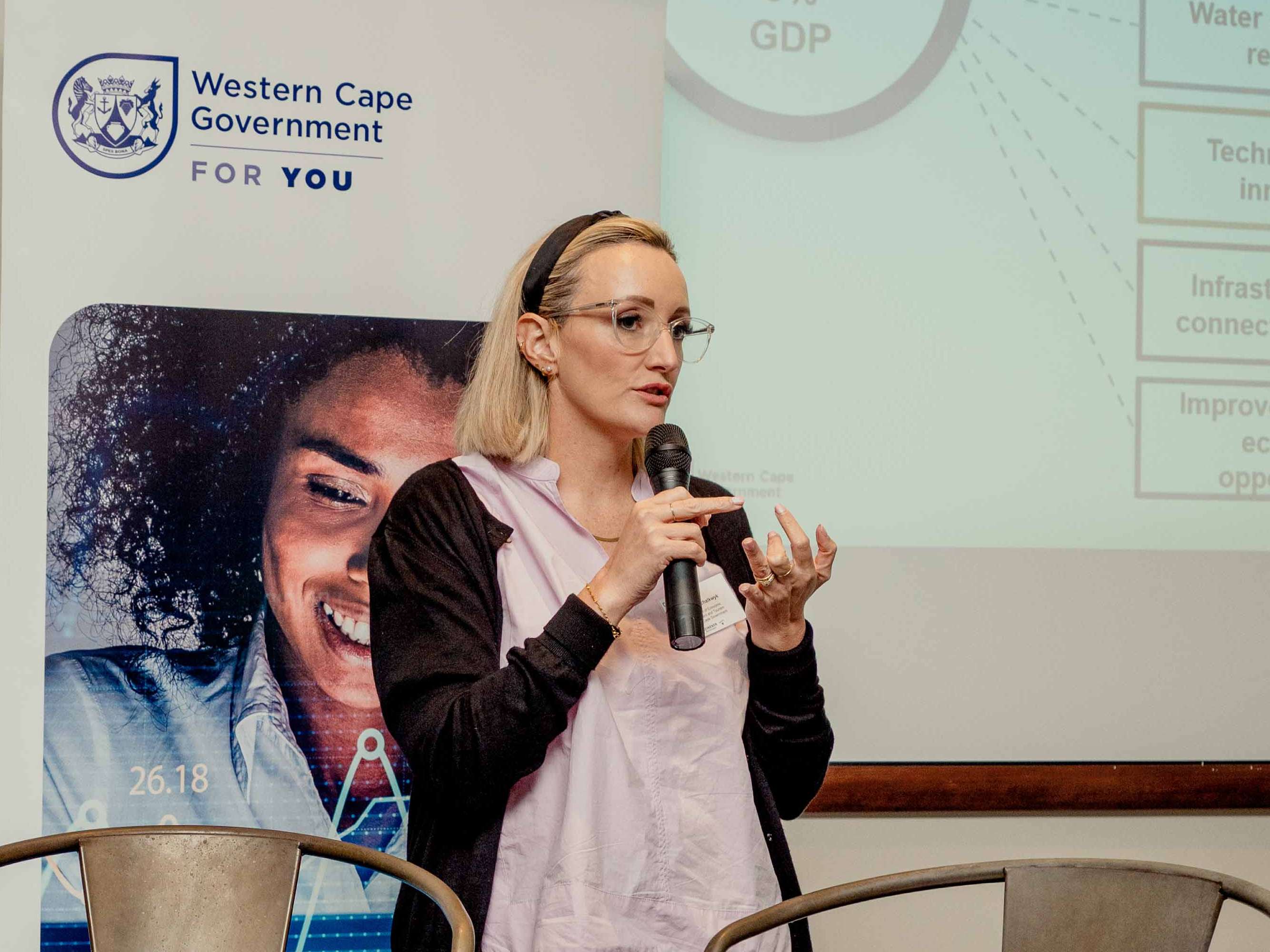Join us to shape a better future, contact Secretariats:
Narieman Solomon Tariro Chivige

Global Competitiveness Index 4.0
Pillar 2: Infrastructure 8.3%
A. Transport infrastructure 50%
I. Road 25%
2.01 Road connectivity
2.02 Quality of road infrastructure
II. Railroad 25%
2.03 Railroad density
2.04 Efficiency of train services
III. Air 25%
2.05 Airport connectivity
2.06 Efficiency of air transport services
IV. Sea 25%
2.07 Liner shipping connectivity
2.08 Efficiency of seaport services
B. Utility infrastructure 50%
I. Electricity 50%
2.09 Electricity access
2.10 Electricity supply quality
II. Water 50%
2.11 Exposure to unsafe drinking water
2.12 Reliability of water supply
The Chamber contributes to strengthening of the business environment by:
1. Supporting regional sector and value chain development programmes - for firms to express their concerns about issues affecting business in their sub-sector and to steer systematic improvement to realise faster growth of the sub-sector.
2. Supporting Business retention and expansion programmes - to steer systematic improvement of their local business environment.
3. Facilitating dialogue with the public sector - towards more effective public investment, smarter service delivery, procurement efficacy and to stop doing what the private sector can do with greater efficacy.
4. Creating large-scale awareness of issues concerning business, which needs to be rectified by the public sector or other responsible parties. Various platforms are utilised including events with key stakeholders, traditional media and social media.
The business sector in the Western Cape is well aware of the devastating impact of water rationing, and how the spectre of Day Zero in Cape Town negatively impacted the tourism sector. Water infrastructure challenges elsewhere in the country, such as in Gauteng with its acid mine drainage, serve as a reminder that the current infrastructure status quo could get a lot worse.
A recent Western Cape Infrastructure Framework noted that “the Western Cape has limited water resource options for future growth.” It went on to recommend urgent demand management, as well as research into alternative water sources. It also bemoaned a “chronic shortage’ of capital for water and sanitation projects. The drought brought all these issues to the fore.
Fortunately, the Western Cape has a deep pool of water-wise expertise to address challenges, even if government funding remains tight. The collaborative efforts witnessed during the recent drought demonstrated the potential of public /private partnership in finding solutions to seemingly intractable problems.
Cape Town’s burgeoning population is putting the City under pressure in terms of water infrastructure provision. According to the City’s own stats, it has 11 dams, 12 water treatment works, 500 pump stations, 130 reservoirs and 23 wastewater treatment facilities. It maintains a 20 000 km pipeline network and responds to an average of 400 daily pipe bursts.
In a similar vein, the national department must monitor critical infrastructure in rural areas, and guard against rampant illegal abstraction from rivers.
SEWERAGE
For some, the measure of civilization is the standard of sewerage management. Inadequate sewerage results in compromised public health, which in turn impacts other aspects of community life.
While the Western Cape enjoys a relatively healthy sewerage system relative to other provinces, rapid urbanisation and ‘semigration’ presents massive local government challenges, particularly in an era of dwindling public finances. Public health and quality of life are key considerations for investors and skilled migrants who are drawn to world-class cities with modern infrastructures. Effective management of sanitation and sewerage are therefore important elements when maintaining the Western Cape’s reputation as an investor-friendly location.
Occasional management glitches such as plumes of partially treated sewage drifting close to international blue flag beaches detract from the Province’s tourist appeal. However, civil society can play a preventative role by highlighting such instances.
ENERGY
Eskom load shedding has made energy a household talking point, and herein lies an opportunity for public pressure on government to reform its energy policy. Many businesses cannot afford to absorb the cost of power contingency plans, and the disruption to economic life restricts economic growth and is fatal to many micro-enterprises. Blackouts are also a major investment deterrent.
The Western Cape government, with Cape Town at the vanguard, is actively seeking ways of reducing reliance on Eskom and has been lobbying government to deregulate the energy space. This would allow Cape Town – and other cities should they so wish – to develop their own energy procurement plans with the aim of taking charge of their own destiny.
Cape Town’s Steenbras Hydro Pumped Storage Scheme allows the City to partially buffer its residents from Eskom load shedding, with a reduction of two load-shedding levels thanks to the Scheme’s power generation. The City and the City of Johannesburg are collaborating on effective demand side management to meet the Eskom challenges. High stages of load shedding threaten critical infrastructure, to the point where the City is considering legal advice on whether it can legally bypass cumbersome national procurement processes in emergency situations.
The Chamber supports efforts to deregulate the energy space, which we believe would be in everybody’s long-term best interests.
TRANSPORT
The movement of goods and provision of services relies on an efficient transport system, one where all constituent parts interact as smoothly as possible.
Sadly, impressive new transport upgrades in recent years have been offset by major transport challenges, such as the implosion of the Passenger Rail Service managed by PRASA. This network was already under pressure pre-Covid but completely collapsed in some areas during the course of the pandemic. The negative impact on the labour force is enormous, particularly for lower-income families who can ill afford the additional cost of alternative transport, or who might miss work opportunities as a result of transport disruptions. This in turn has a ripple effect on the economy.
The Chamber has been actively lobbying for national government to allow the City of Cape Town to take control of the passenger rail service in order to bolster the transport space.
Similarly, the Chamber is lobbying for greater public-private collaboration in the functioning of the Port of Cape Town, where infrastructure problems and container terminal congestion impact freight movements, which in turn affects imports and exports. Partly, these issues are influenced by external factors, such as the international crude price or wars. However, national government also needs to be held accountable for management failures within Transnet, as well as procurement challenges that affect the efficient functioning of our Ports.
Aviation also has major challenges, although the Western Cape at least boasts the continent’s top-rated airport - Cape Town International. Civil aviation is vital to international trade, investment and tourism, as stated in the National Aviation Policy. The Chamber will work to ensure government stakeholders ensure their Policy has the desired effect.
ICT
The Western Cape has identified ICT as a major driver of the provincial economy. The Province’s white paper entitled “Preparing for the Knowledge Economy of the 21st Century” lays out an optimistic vision of how the Western Cape can take a lead in this crucial economic sector. To a certain extent, this has been realised, with major investments in this space over the past 20 years.
ICT is a crucial factor in measuring global competitiveness. Mobile cellular telephone subscriptions, mobile broadband subscriptions, fixed broadband internet subscriptions, fibre internet subscriptions, and internet users: are all ICT indicators when rating the economy’s ICT sophistication. In this regard, the Province has made significant strides, buoyed by the involvement of global market players.
ICT underpins the modern economy, particularly in the Western Cape where financial and business services make up a significant proportion of the province’s GDP. In many ways, ICT is the tonic needed to keep the economy growing and competitive on the international stage.
News that the world’s largest company, Amazon, wishes to locate its Africa head office in Cape Town, is testimony to the City’s stature as a regional centre of ICT excellence.








